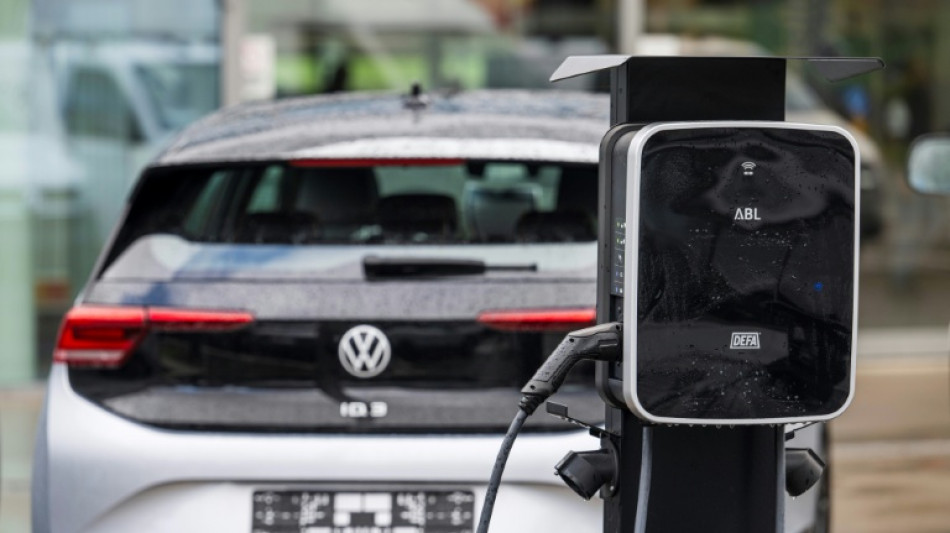

Carmakers to push EU for 2035 combustion-engine ban rethink
Europe's biggest carmakers are to hold talks with EU chief Ursula von der Leyen on Friday as the industry pressures the bloc to revise plans to end combustion-engine vehicle sales by 2035.
Suffering from fierce Chinese competition and a stuttering transition towards electric vehicles (EVs), embattled European automakers are pushing for Brussels to reconsider its ambitious climate goals.
"The regulation that is applicable to us is too rigid to produce success, and really we believe must be adapted to reality," said Sigrid de Vries, director of the European auto lobby ACEA. "We need to be more pragmatic."
Friday's meeting in Brussels is the third under an EU initiative launched in January to help a sector that employs 13 million people and accounts for about seven percent of Europe's GDP.
The first gathering resulted in a reprieve for automakers, with the European Commission allowing them more time to meet the first carbon emissions target under plans to phase out sales of new combustion-engine vehicles by 2035.
But companies are now pushing for more systemic change.
- 'Hands tied' -
In an August letter to von der Leyen, carmakers and their suppliers lamented a series of challenges including dependency on Asia for batteries, high manufacturing costs and US tariffs, which have been upped to 15 percent under a deal struck with Brussels.
Paired with an uneven distribution of charging infrastructure, they said those obstacles are holding back sales of EVs, which account for about 15 percent of new cars sold across Europe.
"We are being asked to transform with our hands tied behind our backs," Mercedes-Benz chief Ola Kaellenius and Matthias Zink, of the automotive parts supplier Schaeffler, wrote on behalf of their industries.
Describing the 2035 target as "no longer feasible", they called for incentives such as tax breaks to boost demand for EVs.
They also want more room for plug-in hybrids, highly efficient combustion-engine vehicles and other low- but not zero-emission vehicles.
That is opposed by green groups and EV sector businesses, more than 150 of which wrote a letter to von der Leyen this week urging her to "stand firm".
Road transport accounts for about 20 percent of total planet-warming emissions in Europe, and 61 percent of those come from cars' exhaust pipes, according to the EU.
Michael Lohscheller, chief executive of Swedish EV company Polestar, said the 2035 target gave "clarity to industry, direction to investors and certainty to consumers".
Weakening it "would harm Europe's ability to compete", he said.
- Europe's 'E-car' -
The range of new European EVs unveiled at the Munich auto show this week showed that the targets were working, said William Todts, director of the clean transport advocacy group T&E, who is to take part in Friday's talks.
"For the first time in 10 years, Germans can say we are as good as the Chinese, almost. And the only reason they're doing that is because of the CO2 standards," he told AFP.
"They've had to invest more than they wanted, and this has an impact on dividends and short-term profits, but it does make them more competitive," he said.
Yet in a sweeping speech on Wednesday, von der Leyen hinted that tweaks might be on the cards.
"With respect for technology neutrality, we are now preparing the 2035 review," she said, referring to carmakers' demand that not only EVs but other low-emission technologies be allowed on the market after 2035.
The German politician also announced plans for a "small affordable cars initiative" for Europe to "have its own E-car" -- but provided no detail about what that entailed.
And she repeated a pledge to make available 1.8 billion euros ($2.1 billion) to boost battery production in the bloc.
The talks come at a hard time for European producers, whose sales are being eroded by Chinese competitors such as BYD and GAC.
In Germany, the auto sector has already shed more than 50,000 jobs over the past year, according to the consulting firm EY.
Volkswagen is planning thousands of layoffs in the coming years while its subsidiaries Porsche and Audi, as well as many German auto suppliers, are also cutting jobs.
T.Mostafa--CdE



